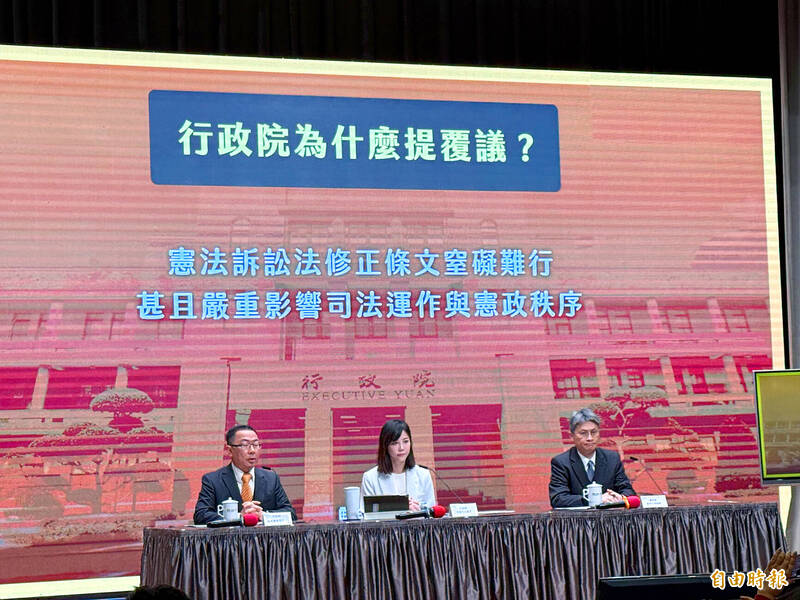《TAIPEI TIMES》Constitutional Court changes to be sent back

Cabinet officials explain the reasoning behind a request for legislators to reconsider amendments to the Constitutional Court Procedure Act at a news conference following the weekly Cabinet meeting in Taipei yesterday. Photo: Chung Li-hua, Taipei Times
By Fion Khan / Staff writer, with CNA
The Cabinet yesterday said it would request a new vote on Constitutional Court reforms that lawmakers passed on Dec. 20, signaling further deadlock between the central government and the opposition-controlled legislature.
President William Lai (賴清德) yesterday approved the request to send the changes to the Constitutional Court Procedure Act (憲法訴訟法) back to the legislature, Presidential Office spokesperson Karen Kuo (郭雅慧) said yesterday.
As the bill is highly controversial, the government hopes the ruling party and the opposition could re-examine the bill and reach a consensus through rational communication and negotiations under the constitutional mechanism, she said.
Earlier yesterday, Cabinet spokesperson Michelle Lee (李慧芝) cited Premier Cho Jung-tai (卓榮泰) as saying that the amendments would allow the legislature to override the judiciary, setting an “unreasonable threshold” that would disrupt the operations of the court.
That could affect the public’s right to seek remedies or to resolve constitutional disputes, endangering the constitutional order, Cho added.
Also, amendments to Article 4 of the act would not help to ensure the stable operation of the Constitutional Court, as it does not set a legal time limit for the legislature to approve the nomination of grand justices by the president, Cho said.
A constitutional interpretation would be sought if the legislature votes down the motion to reconsider the bill, Democratic Progressive Party (DPP) caucus chief executive Rosalia Wu (吳思瑤) said.
The political impasse over the issue, created by a combination of court vacancies and reforms sought by the legislature, is likely to continue.
The legislation would require at least 10 justices on the court — which normally has 15 members — to hear a case, and at least nine justices to back any unconstitutional ruling. Current rules do not specify a minimum number of justices required to hear a case. Instead, they simply mandate the presence of at least two-thirds of all sitting justices, with a ruling determined by a simple majority vote.
While the government has asked the legislature to hold a new vote on the bill, it is unlikely to yield a different result.
The opposition-backed bill creates problems, as the eight-year terms of seven of the Constitutional Court’s 15 judges ended on Oct. 31 last year.
With only eight justices left, the court does not have the number required by the bill to hear cases.
Lai put forward seven nominees to fill the vacancies, but all of them were rejected by the legislature on Tuesday last week, with opposition parties claiming they were too partisan.
Lai has not yet sought another vote on the nominees or named new candidates.
Minister Without Portfolio Lin Ming-hsin (林明昕) also signaled support for a court challenge at a news briefing yesterday, saying that the reforms would contravene the constitutionally enshrined separation and balance of powers between the five branches of government.
Taking that road risks setting off a potential crisis, as the Constitutional Court would be asked to rule on legislation directly relating to its own powers, with only eight judges available to hear them.
However, under Article 43 of the act, the court can issue a preliminary injunction against a law with a quorum of two-thirds of incumbent justices and a majority voting in support of the injunction.
Alternatively, the government could hold negotiations with the legislature to select seven Constitutional Court nominees who are acceptable to both sides.
If it did so, the government could still seek an injunction and constitutional interpretation for the reforms after the new justices are seated.
Meanwhile, Lee said the Cabinet had not received any official notice of two other sets of controversial amendments to the Public Officials Election and Recall Act (公職人員選舉罷免法) and the Act Governing the Allocation of Government Revenues and Expenditures (財政收支劃分法) that were also approved by opposition lawmakers last month.
Those amendments would tighten requirements for petitions to recall elected officials and reallocate more funding from the central government to local governments.
Lee said if the amendments are sent to the Executive Yuan on the last working day before the Lunar New Year, the Executive Yuan would have until Feb. 2 to request that the legislature reconsider the bills.
If the Executive Yuan is to make a request during the Lunar New Year, the legislature would have to handle it within 15 days, she said, adding that the motion would be considered passed otherwise.
If the lawmakers vote down the motion, the Executive Yuan would discuss further actions, Lin said.
The president would have 10 days to promulgate the law, which would not come into effect immediately after the legislature votes down the motion, Lin added.
新聞來源:TAIPEI TIMES















